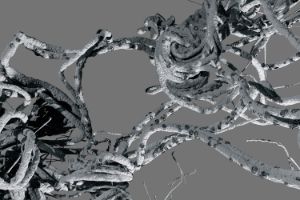Concert
Interpoiesis 4
George Lewis, Georges Aperghis, Sofia Jernberg, Jeffery Renard Allen, Gunde Jäch-Micko

Visual concept & design: Eps51, Berlin
The concert series “Interpoiesis” in silent green’s Kuppelhalle facilitates multi-generational and intersectional musical encounters of artists from diverse backgrounds who have never collaborated with each other before.
“Interpoiesis” is a concert series that presents new projects arising from multi-generational and intersectional collaborative encounters between artists from diverse backgrounds. “Interpoiesis” denotes an interstice of co-creation, in reference to Donna Haraway’s notion of “sympoiesis” (“making-with”) as the condition of always doing in relation to other(s), the impossibility of creating anything alone.
MaerzMusik invites four constellations of artists to propose a collaborator they have not worked with before, and share their conversations and processes in and through sound and performance. The four concerts display different stages of co-creations, from finalised works to intermediary results of collaborative processes to open experimentations that challenge preconceived roles and relations within the spectrum of artistic and social practices.
This concert kicks off George Lewis and Jeffery Renard Allen: In Interpoiesis 4, composer George Lewis and writer Jeffery Renard Allen discuss the creative process around Song of the Shank, a new, extended work for sinfonietta-sized instrumental forces and two soloists: voice and piano. The work is slated to have its premiere in June 2023 by the renowned Ensemble Modern. Allen will create the libretto based on his 2014 historical/speculative novel around Blind Tom, Song of the Shank.
Song of the Shank is based on the life of the sightless Afrodiasporic composer and virtuoso pianist Thomas Wiggins, born under US chattel slavery in 1849. Popularly known as “Blind Tom,” this child prodigy became a major 19th century American musical figure despite being enslaved throughout the formative part of his career. An 1860 account of a Blind Tom performance cited by the African American aesthetician Alain Locke recalls the young Mozart: “He could play flawlessly any composition he heard played, usually on once hearing it, could improvise correctly and expressively, and is said to have had a repertory of several thousand pieces.” In his best-known work, The Battle Of Manassas (1863), Blind Tom deploys the classic American trope of musical depiction, as thunder, lightning, and the sounds of cannons are recalled via cluster-like sounds that anticipate early Henry Cowell and the Futurist composers.
Allen’s novel, the product of extensive research, deals with the relation among music, identity, and human rights in ways that are most relevant to contemporary experience worldwide. The novel confronts the challenges Tom’s music poses to white conceptions, not only of black subjectivity, but of their own. Published accounts of Tom’s music, which regularly featured debates about originality in “the Negro,” congeal into a complex of paradoxes, all prompted by Tom’s undeniable soundings.
The musical work follows the novel in being not a simple recounting of Tom’s life, but a complex portrait of a child, accomplished beyond his years, coming to musical and personal maturity in a society trapped in spurious binary codes of racialization that permeated literally every aspect of existence. Similarly, the music does not re-present the music of Tom’s era, but instead imagines what a 21st century Thomas Wiggins might sound like. The two soloists, voice and piano, represent two imagined aspects of Tom’s experiences and personality, presenting both agonistic and complementary perspectives.
In the end, Blind Tom’s music transcended his objectification and confounded the racial order, showing the power of creative work to enact social change and promote new modes of consciousness. This is this kind of work that Ensemble Modern. George Lewis, and Jeffery Renard Allen have been pursuing for many years, and this new project amplifies that direction in relevant and salutary ways.
Programme
20:00–21:00
George Lewis – lecture-presentation
with Jeffery Renard Allen
Song of the Shank (2023)
Für Stimme, Piano und 15 Instrumente
George Lewis – composer
Jeffery Renard Allen – librettist
Ensemble Modern
21:00–22:00
Georges Aperghis
14 Récitations
pour voix seule (1978)
Récitations 1–4
Sofia Jernberg – voice
Georges Aperghis
The Only Line
for violin and electronics (2009)
Gunde Jäch-Micko – violin
Sofia Jernberg
One Pitch: Birds for Distortion and Mouth Synthesizers (2022)
Sofia Jernberg voice